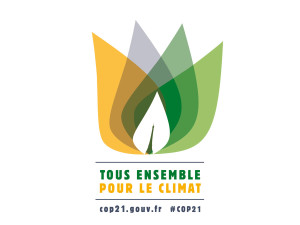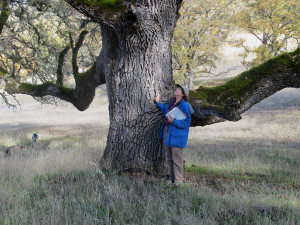COP21 Diary – Sky High Ambitions for Climate Solutions
By Laurie Wayburn, President of Pacific Forest Trust
 Travelling Air France to the Paris Climate Talks, climate solutions, both large and small, were featured prominently.
Travelling Air France to the Paris Climate Talks, climate solutions, both large and small, were featured prominently.
Air France, a sponsor of the 21st session of the Conference of Parties (COP21), highlighted its latest environmental commitments in their stylish, progressive magazine, not only for climate change but for the broader sweep of a more nature-centered sustainability.
They showcased their airport that is vegetated with native plants and now promote beekeeping. There was a spread on green roofs, shared gardens, organic agriculture, and, bien sur (of course), a piece on great bread made from organic French flour! The magazine also pointed out that many of the COP venues serve all vegetarian options which cause less net CO2 emissions than meat based diets. These are all good things that will help towards reducing CO2 emissions—especially if such actions are replicated on a large scale.
At the center of their magazine a quiz on COP21 posed eight questions to passengers and explained a little about climate change.
The second question of the quiz: How much of the global CO2 emissions are from deforestation and forest degradation?
Answer: 20%
As of January 2015, the forest emissions again reached one-fifth of global emissions. Understandably so, forests are front and center at the climate summit.
When I started working on forest conservation and climate change issues, some 23 years ago at the 1992 talks, forest loss and degradation contributed 20% of CO2 emissions globally. In intervening years, whether due to accounting changes, temporal progress in forest sustainability, or more sadly, growth in emissions from other sectors, its contribution fell to about 15% several years ago.
Now, forests are being lost again at a non-declining rate, despite the good intent and powerful words of the New York declaration last year. And, as David Wear pointed out in his recent study, the U.S. is part of the problem. We don’t really like to talk about it, but forest loss is the largest source of land conversion in the U.S.—and that’s a problem because we count on our forests to absorb 10-12% of domestic CO2 emissions every year.
Myself, along with Pacific Forest Trust Board Chair, Andrea Tuttle, are participating in the Paris Climate Talks, again advocating for forests and how we can leverage them for a safer climate—another step toward reducing atmospheric CO2 but a much larger one, if a global agreement is reached at COP21.
View Other COP21 Posts:
- Climate Progress: A better problem to have – December 8, 2015
- Reaching a Global Agreement at COP21 – December 7, 2015

